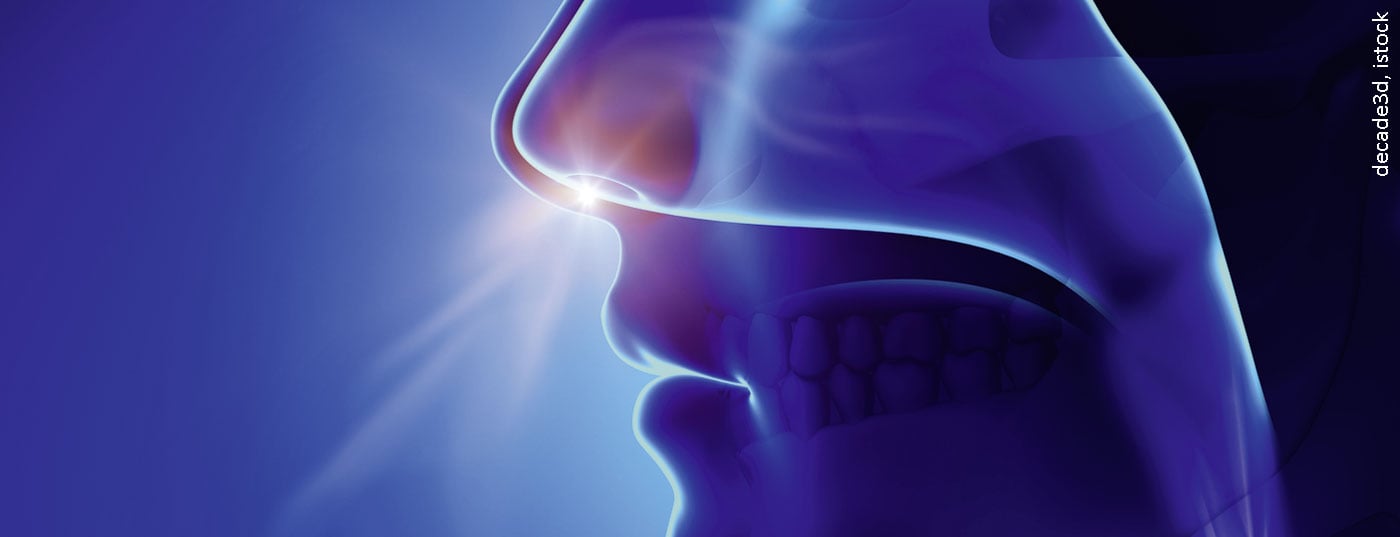The monoclonal antibody dupilumab, which has already been approved by the European Medicines Agency (EMA) for the treatment of atopic dermatitis and asthma, is now also available for patients with chronic rhinosinusitis.
In adults with chronic sinusitis with polyposis nasi, Dupixent® can now be used as an add-on after unsuccessful treatment with conventional therapy in the EU. This provides patients in whom systemic corticosteroids or surgical intervention have not been sufficiently effective with another treatment option in the EU. EMA approval was based on the Phase III SINUS-24 and SINUS-52 studies, in which dupilumab 300 mg every two weeks as an adjunct to standard treatment (intranasal corticosteroids) was shown to be significantly superior to placebo plus steroids.
IL4 and IL13 inhibition as a mechanism of action.
Dupilumab specifically blocks the allergic inflammatory mediators IL-4 and Il13. The monoclonal antibody inhibits the growth of polyps and clears the airways. The pivotal studies indicated a more favorable side effect profile compared to cortisone. However, to maintain the effect of the new biologic, it must be given continuously – in the trials, it was administered subcutaneously every two to four weeks. Until now, this active ingredient, like the IgE inhibitor omalizumab (also a biologic), could only be used off-label in the EU in individual cases. In Switzerland, dupilumab has so far only been approved for the treatment of atopic dermatitis – for chronic rhinosinusitis, treatment options in this country are currently limited to intranasal steroids and saline-based nasal rinses/sprays. In exceptional cases, (long-term) antibiotics are administered.
Cytokine mediated allergic reaction
Inflammation of the nasal cavity is often accompanied by inflammatory processes of the sinuses associated with it. If the duration is longer than 12 weeks, it is chronic rhinosinusitis, a form of progression which is associated with considerable suffering. In the etiology, type 2-mediated allergic reactions (IL4, IL13) usually play an important role. Allergenic substances are, for example, pollen, animal hair, molds, flour or latex. As a result, polyps (mucosal formations) may form. Allergies and asthma are considered risk factors for the development of chronic sinusitis with polyposis nasi. In addition to blocked nasal breathing, typical symptoms include mucous secretion and impairment of the sense of smell and taste. The course is particularly severe in patients in whom polyps lead to additional narrowing of the nasal cavities as well as impaired air circulation and infections. Although established therapies such as glucocorticoids (topical or oral) usually respond well, and surgical removal of the polyps also leads to a significant reduction in symptoms in most patients. However, the recurrence rate is high: in some patients, despite surgery, the polyps grow back in such a way that symptoms reappear. For these patients, the newly approved biologic offers a treatment alternative.
Source: Sanofi
HAUSARZT PRAXIS 2019; 14(12): 24











